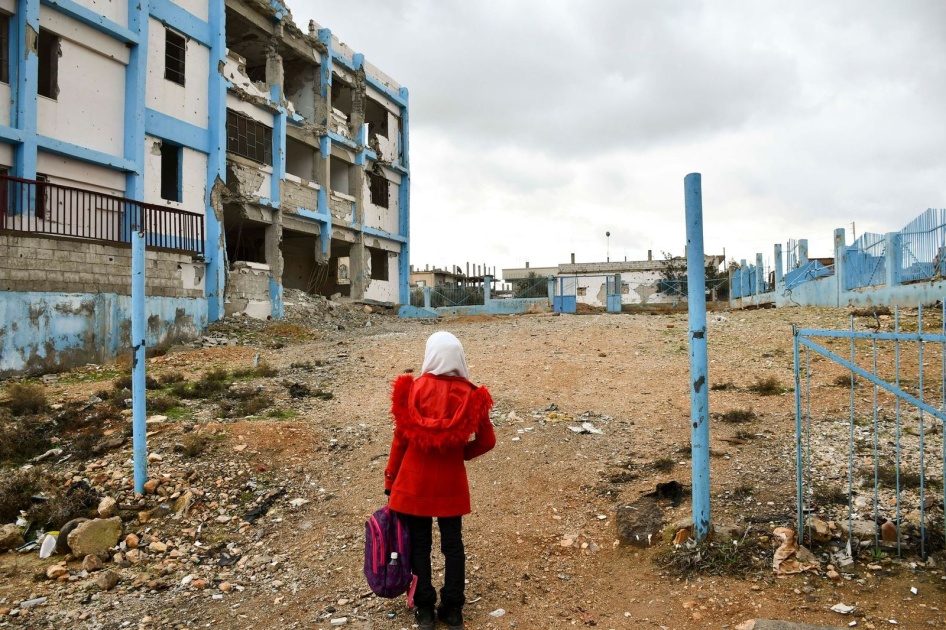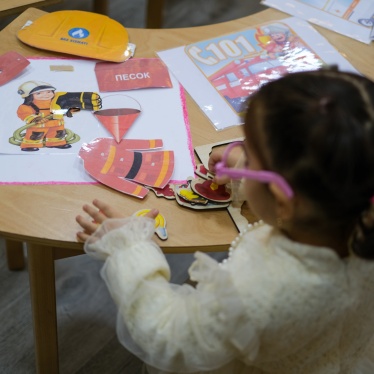This report was authored by a partner organization, the Global Coalition to Protect Education from Attack, and is distributed by Human Rights Watch.
(New York) – About 6,000 attacks on education took place in 2022 and 2023, a nearly 20 percent increase compared with the previous two years, the Global Coalition to Protect Education from Attack (GCPEA) said today in its new report, Education under Attack 2024. Over 10,000 students, teachers, and academics were harmed, injured, or killed in these attacks, which occurred in armed conflicts across the globe.
GCPEA researchers recorded the highest numbers of attacks on education in Palestine, Ukraine, and Democratic Republic of the Congo (DRC) over the past two years. In each country, hundreds of schools were threatened, looted, burned, targeted with improvised explosive devices, or hit by shelling or airstrikes. Attacks rose in Palestine, Sudan, Syria, and Ukraine, while GCPEA observed downward trends in the Central African Republic, Libya, Mali, and Mozambique.
“In places like Gaza, in addition to the horrific loss of life, education itself is under attack,” said Lisa Chung Bender, GCPEA executive director. “School and university systems have been shut down, and in some cases completely destroyed. This will have long term consequences on social and economic recovery, as the very infrastructure needed for peace and stability have been targeted.”
In addition to deaths and injuries, attacks on education damaged or destroyed hundreds of education facilities, forcing temporary or permanent closures and weeks or months of lost learning. Some students also suffered psychological harm from attacks or were afraid to return to school, the coalition found. Girls and students with disabilities were uniquely affected by attacks on education, with both groups experiencing greater difficulties resuming their learning after attacks.
The researchers recorded over 475 attacks on schools in Palestine in 2023, many involving air and ground strikes with explosive weapons. Attacks peaked following the escalation of hostilities in October, when Hamas-led fighters conducted a large-scale attack into Israel and Israeli armed forces carried out an intensive military offensive in the Gaza Strip. Attacks continued into 2024; in Gaza, all universities and over 80 percent of schools had been damaged or destroyed by April, according to the Occupied Palestinian Territory Education Cluster.
Explosive weapons, which were involved in about one-third of all reported attacks on education globally in 2022 and 2023, had particularly devastating effects, killing or injuring countless students and educators and damaging hundreds of schools and universities. In just one example, fragments from an attack on a women’s dormitory at El Geneina University in West Darfur, Sudan, left a woman blind in one eye in June 2023.
Attacks on education involve armed forces and non-state armed groups bombing and burning schools and universities, and killing, injuring, raping, abducting, arbitrarily arresting, and recruiting students and educators at or near educational institutions, during armed conflict. In some cases, girls’ schools and female students are attacked in attempts to keep girls from learning and participating in education. In other cases, schools, students, and educators suffer indiscriminate violence or are targeted for political, military, ideological, or other reasons.
Armed forces and non-state armed groups also occupy schools and universities, for example to use them as barracks, detention centers, or firing positions, placing students in danger and violating their right to education. Military use of schools, places education facilities at increased risk of attack by opposing forces or groups.
Students, teachers, and education personnel continue to be targeted. In Nigeria, abductions of students and teachers continued during the reporting period, although the rate of such attacks declined compared with previous years. Meanwhile, large numbers of students and educators were threatened, abducted injured, or killed in Palestine, Cameroon, and Iraq during 2022 and 2023.
Parties to armed conflicts also targeted schools to recruit children in DRC, Somalia, Syria, and Yemen. In Colombia, at least 25 students were recruited at schools or along school routes in 2022 and 2023, many of them Indigenous students. Armed forces, security forces, or armed groups were also reportedly responsible for sexual violence in, or on the way to or from, schools and universities in at least eight countries, including Cameroon, Niger, and South Sudan.
Attacks on schools made up more than half of all reported attacks on education and military use identified by the coalition. Ukraine and Palestine were the countries most affected, with Ukraine experiencing about 700 attacks on schools and Palestine at least 640 across 2022 and 2023, followed by DRC, Burkina Faso, and Yemen. After the full-scale Russian invasion of Ukraine in February 2022, airstrikes, shelling, and drone attacks damaged schools, including those serving blind students, with the east and south of Ukraine particularly affected.
The military use of schools and universities by armed forces and non-state armed groups increased significantly in 2022 and 2023. The coalition found over 1,000 reports of occupied schools or universities across 30 countries, an increase in both the number of incidents and affected contexts. Compared to “Education under Attack 2022,” which included about 570 such cases, increases were reported in Afghanistan, Colombia, Nigeria, Sudan, and elsewhere.
University buildings, students, and academics also came under fire during the past two years, with over 360 reported incidents. A quarter of reported attacks were against university facilities, while the rest targeted students and personnel. About 760 university students and personnel were injured, abducted, or killed, while over 1,700 were detained or arrested.
GCPEA researchers also found preliminary connections between climate change and attacks on education. For instance, in Burkina Faso and Mali – where desertification, land degradation, and conflict interlink in complex ways – armed groups have targeted school cafeterias and canteens to loot food stores.
As of May 2024, 120 countries had endorsed the Safe Schools Declaration, a political commitment to protect education in armed conflict. By signing the Declaration, countries commit to taking concrete steps to safeguard education, including upholding international humanitarian and human rights law and using the Guidelines for Protecting Schools and Universities from Military Use During Armed Conflict. In line with the Declaration, governments and their partners have made tangible improvements in law and practice, such as issuing military orders to restrict armed forces from using schools for military purposes.
“On average, eight attacks on education were recorded daily over the past two years, meaning a startling number of students were unable to follow their dreams of learning, or develop the skills that an education promises,” said Jerome Marston, GCPEA senior researcher. “Schools should be safe havens, not targets, which is why all governments should endorse the Safe Schools Declaration.”






